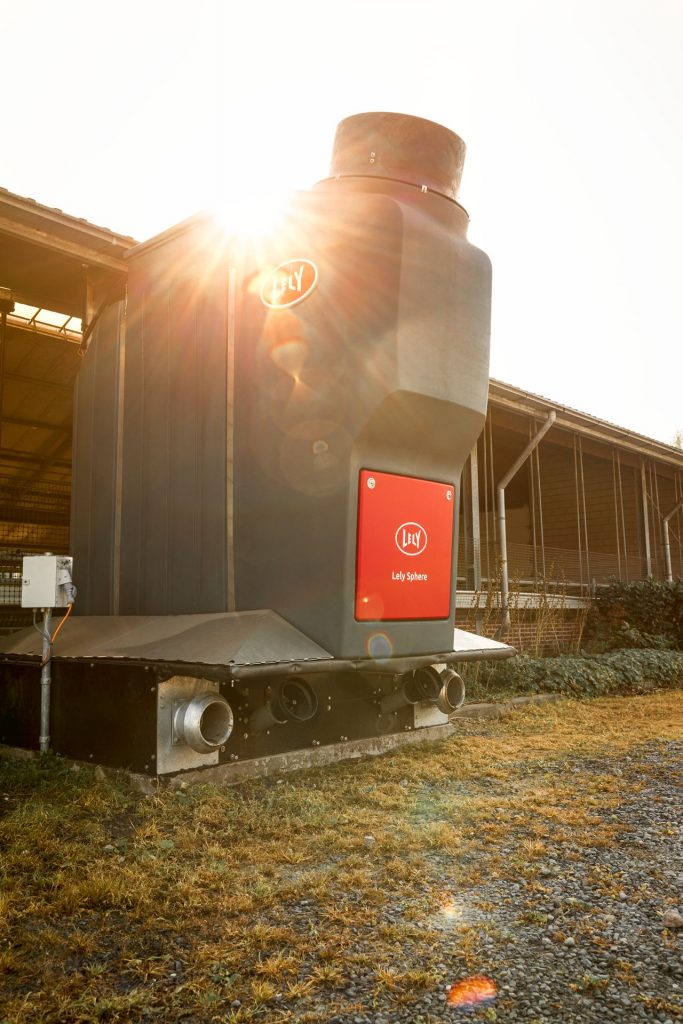LELY
New circular barn system for livestock
Lely presents a new barn system for separating mineral flows and converting emissions into value; Lely Sphere. The system separates manure and urine, converts nitrogen emissions, and creates 3 valuable types of fertiliser. Dairy farmers can use these separated fertilisers for precision fertilisation. This closes mineral loops better, reduces nitrogen emissions, and creates a healthier climate in the barn.
The system was launched today during the Lely Future Farm Days. Korstiaan Blokland, Head of Innovations at Lely, says:
“Lely Sphere is designed to help dairy farmers exploit the valuable nutrients in manure to the maximum, and thus promote crop growth. This practical solution is easy to deploy, and part of the transition to more sustainable and even more circular dairy farming.”

“Livestock farmers can use the exact type of fertiliser needed to fertilise soil and crops, precisely where and when it is needed.”
Better closure of mineral loops
For dairy farmers, closing mineral loops is becoming increasingly important because it improves the social acceptance and sustainability of farming. Minerals leave the company through milk, meat, manure disposal and emissions from manure. By making better use of the minerals in manure and converting losses through emission into value, the mineral loop is better closed and less fertiliser needs to be purchased.
Around 70% reduction in ammonia emissions
Official measurements at test farms have shown that total ammonia emissions from barns are reduced by approximately 70%. As an emission-limiting system, Lely Sphere also distinguishes itself by reusing nitrogen as a substitute for chemical fertiliser. Practical tests have shown that 10 to 20 kg nitrogen per cow per year can be ‘harvested’.
How Lely Sphere works
The Sphere system consists of various simple and easily applicable parts. In the first place, manure and urine are immediately separated from each other. The urine flows through separation strips to the pit, while the manure remains above. This is the first step to limiting emissions, because separating at the source results in less ammonia in the barn. The Lely Sphere N-Capture creates an underpressure in the pit, and extracts manure gases that are created under and just above the barn floor. This also includes the remainder of the ammonia formed on the walking surface and the pit. The filter in the N-Capture captures the ammonia, and uses acid to convert it into circular fertiliser. The Discovery Collector barn cleaning robot regularly sucks up the solid manure, keeps the barn floor clean, and transports this solid fraction to a chosen disposal site.
Optimal fertilisation of crops
The Lely Sphere system creates three types of fertiliser:
- mineral nitrogen of mineral fertiliser quality in the discharge water produced by the N-Capture;
- phosphate and organic nitrogen in the solid fraction;
- potassium in the thin fraction in the pit.
Livestock farmers can use the exact type of fertiliser needed to fertilise soil and crops, precisely where and when it is needed. As an added bonus, fewer emissions are formed when spreading on grassland.
The 3 types of fertiliser allows livestock farmers to respond better to the needs of their grass and corn. This is just the beginning of the Sphere system, as Lely is continuing to look for possibilities to get even more value from manure, and optimise precision fertilisation.

Healthier barn climate
Separating manure and urine and ventilating the pits reduces ammonia in the barn. Extracting manure gases from the pits also increases safety, as these harmful gases no longer accumulate in the manure pit. It also keeps the air in the barn fresher. The natural ventilation in the barn is maintained, and cows can walk in and out of the barn freely. The Discovery Collector keeps the barn floor cleaner, which improves hygiene and claw health. Besides creating value from manure, Lely Sphere also keeps the barn climate healthy and safe for humans and animals.
The next steps
Work on developing Lely Sphere began in 2015. The systems have been operational since 2017, and are now running on four test farms. The system has international potential, but initially Lely will focus on the Dutch market. At the moment, approximately 60% of the official measurements necessary for recognition under the Netherlands Livestock Farming Ammonia Regulation (RAV), have been completed. Meanwhile, Lely Sphere does have a provisional RAV of 3.6. It is expected that this official recognition as an innovative housing system against ammonia emissions will be granted in the third quarter of 2021. Following this, Lely hopes to make the system available to more livestock farmers in the Netherlands.
For more information, go to: http://www.lely.com/sphere/
Abou the Lely Group
Lely, founded in 1948, directs all its efforts towards creating a sustainable, profitable and enjoyable future in farming. Circling the cow, the company develops premium robotics and data systems that increase animal welfare, flexibility and the production on the dairy farm.
For more than 25 years, Lely has been leading in the sale and service of automated milking systems to successive generations of dairy farmers across the globe. Every day, Lely inspires her employees to offer customers innovative solutions and be a reliable partner for long-term advice and support. With her Head office in The Netherlands and a worldwide network of dedicated Lely Center locations for tailor-made sales and support, the Lely Group is active in more than 45 countries and employs around 1.600 people.
More information: http://www.lely.com
Contact:
communications@lely.com
+31 (0)88 122 82 21